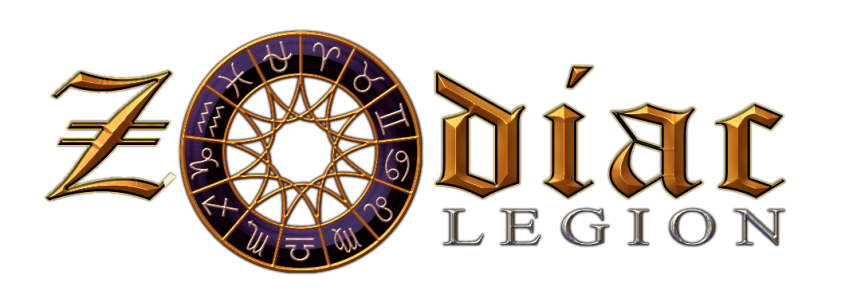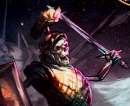
Welcome to an interview with Alexandre “Galdred” Boureau, the solo developer for Studio Draconis. Galdred is currently working on the X-com-inspired Zodiac Legion, which is showing great promise for the future. So, let’s find out a bit about them, and what Zodiac Legion will bring to the genre!
Who is Studio Draconis?
I founded Studio Draconis to make Zodiac Legion, and to focus on crunchy tactical and strategy games. It’s a solo dev company, as I work entirely with contractors.
Who is Galdred and what is your background when it comes to creating and playing games? Any stand-out favorites – games that left a lasting impression? I assume X-com is one.
I ended up playing X-COM pretty late, because I kept my Atari 1040 STe way past its prime.
The first games I obsessed over were the tabletop dungeon crawler Heroquest, and its 40K cousin Space Crusade, as well as Laser Squad, so I could say that 1989 was a pretty important year for me, as it was also the time I got my Atari computer to begin with.
I played both Heroquest and Laser Squad briefly in 1990 at my cousins’ home, but I couldn’t find them anymore for several years, so being unable to actually play them again may explain why they were so influential to me.
What drew me to Heroquest was the dungeon crawling experience played out on tabletop. It was also my first game with a persistent campaign that wasn’t a gamebook (I’d read/played the Lone Wolf series before that).
In Laser squad, I fell in love with the tension of the hidden movement of the opponent, and the constant risk of getting one of your characters ambushed around a corner.
Dungeon crawlers and tactical games have been my preferred genres since that time, along with 4X when I discovered Civilization shortly after (it was also one of the last major strategy games to be released on Atari computers, so I spent countless hours on it too).
Heroquest and Space Crusade shortly led me to playing Space Marines (aka large scale 40K with tiny models) with friends during middle school, so I’ve been a 40K early adopter in a way.
I heard friends talk about X-COM, but I didn’t have a PC at that time, so I ended up working on my own “Atari X-COM” version until I went to college, which was also the time I got a PC, and played my first X-COM game: Apocalypse. I played UFO Defense much later, around 2005.
After graduation, I worked as a software engineer for a company producing set-top boxes, while making a few game prototypes during my spare time, but I really wanted to create a game that would combine dungeon crawling and the X-COM geoscape, as this was never attempted before. I took that chance when I had to leave my day job to follow my wife to China.
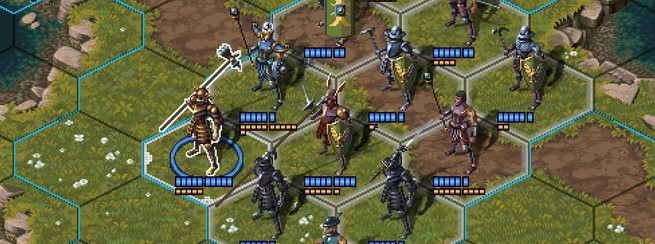
Going by Steam, Zodiac Legion is the only game listed under Studio Draconis – that makes me think it’s the studio’s first game, is this true? And if so, what inspired you guys to work together to create this fantasy X-com type of game? Did it start out as a team effort?
Zodiac Legion is indeed the studio’s first game, as well as my first commercial game. I started on my own, and looked for other partners to recruit after I got an early prototype going. After two partnerships fizzled out before taking off, I decided to remain alone in the company, and work with freelancers instead. I was lucky to find reliable long-term partners over the years, because it gave the game some much needed stability in terms of its identity.
Cyangmou and Wolfenoctis, the artists who defined the initial art direction of the game, moved to other projects, but I was l fortunate to have created a lasting partnership with the freelancers I contracted later:
- Maciej Bogucki for story and level design
- Alcibiade Minel for the sound and music
- Mathieu Chauderlot for pixel art
- WillSama for testing and QA
When reading on your website, I noticed that you are the only one listed as a developer. Does that mean you do all the heavy programming?
I’m responsible for all the programming, but a part of the heavy lifting is done by our open source engine (Moai).
Is it much work for one to do alone, or maybe is it something that works to your advantage? Intimate knowledge of the programming and systems in place, perhaps?
Working alone in a field makes some things easier, as I know the codebase of the game very well. But it makes it slower to implement things at the same time, as programming is the main bottleneck, but I prefer to dedicate the funds to improving things I cannot realistically do on my own for now.
Zodiac Legion has been in development for a long time (10 years) – has the progress slowed, become faster, or maintained the same development speed since its creation?
The development pace depends on a lot of external and internal factors: I had to take a few breaks to pick up contract work, or to address family issues. But it also depends a lot on the task at hand: when implementing new systems, it can take weeks or months between updates, while correcting bugs or modifying existing issues results in a much shorter development cycle. Lately, there were quite a few major features to add, both in our workflow and in the game itself:
We’re almost done with our semi-procedural level system, which combines preset areas that are randomly shuffled into “slots,” a bit like in OG X-COM and XCOM2. I also added quite a few tools to make animation workflow and level control a bit more automated.
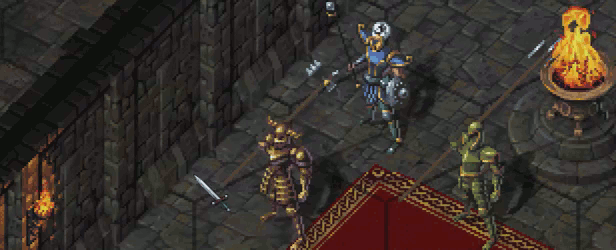
When it comes to financing the project all this time, has your own pockets been funding the game, or has capital been injected from the outside?
A bit of both: I started funding most of the game by myself, then I borrowed money from the bank and my relatives. My wife also covered most of our household expenses, allowing me to spend most of my funds on the game. We were also very lucky to get significant funding from the French National Centre of Cinema (CNC), and the region of Provence-Alps-French Riviera, who believed in the potential of the project.
What is taking the most development time – the programming, or the artistry, like music, writing, and art/textures? Has this ever led to bottlenecks, having one waiting for the other type of situation?
The programming is clearly the largest part, but that is also because I’m more cautious with my funds than with my time.
As I work with freelancers with their own schedules, they usually work whenever they have time themselves, and I sometimes integrate their work much later too (usually after I’m done with the current major milestone).
What engine is Zodiac Legion running on? Is it working well for the intended purpose?
Zodiac Legion is running on Moai. It’s a relatively old open source engine. It was also used for Double Fine’s Broken Age and Klei’s Invisible Inc. The reason I went with it was to remain independent from any third party decisions when it came to development, and the engine being open source allows me to modify it to suit our needs, so I’d say it has worked well for the intended purpose, even though I sometimes regret not having the ease of use and the ecosystem of Unity, but its pricing disaster revealed the dangers of relying on free lunch!
On Steam, Zodiac Legion is listed as it’s going to be self-published, but I couldn’t help to notice that the indie publisher Hooded Horse is following you on Twitter(X). Is there something to this, or just a coincidence?
We chatted from time to time, but that’s about it so far. Tim from Hooded Horse has been of great help regarding marketing topics, and I’m very thankful for all his advice.
Are you searching for a publisher?
I’m not actively searching for one, but I’m not necessarily against it either. It would mostly depend on what he could bring to the table.
How come? Is it important to remain independent? To have full ownership what is being created?
There are quite a few great perks that come with a publisher, especially for a small studio like ours:
- Name recognition (though that also depends on the publisher in question)
- Marketing and PR support
- Established contacts with some third party actors (especially in Asian countries, where it can be difficult to reach the audience).
But it’s true that they all come at the cost of independence, not only of the game itself, but of its potential expansions and sequels as well. Publishers also typically take a significant part of the earnings, so I’d need to be convinced that their impact would be higher than the cost.
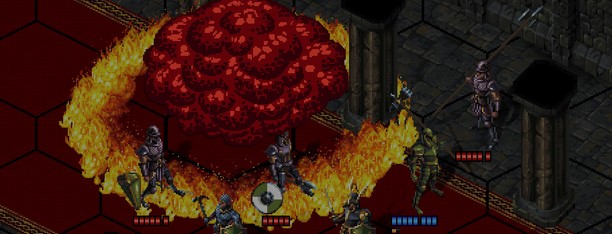
Now to the game at hand, Zodiac Legion. It’s set to be released in Early Access in late 2024. How come it will be early access? Is the money from sales required for continued development?
More money is always helpful, but the plan had always been to go for early access.
There are several reasons for that:
- We want to make the game available as soon as it’s sufficiently fun. This genre works pretty well with early access, as such games have a significant degree of randomness and replayability.
- It’s very hard to get sufficient feedback about the game’s systems from testers alone for such complex games, so early access makes it easier to “scale” the testing phase, while still relying on the most dedicated fans.
Anyway, we don’t plan to release the game, even in EA, until we’re happy with its core systems. I think I’ve been mentioning this from 2015 on RPG Codex, so I have pushed the early access date a lot already to further polish the game.
There is a demo out, how was the response to the demo? Did people enjoy it? Was there something that surprised you, that the public didn’t seem to like perhaps? Or maybe the opposite.
We had a serious onboarding problem at first, with the game UI being too confusing for many players. That was our biggest surprise actually, with a significant part of the players dropping the demo after 2 minutes. The reception among those that remained was much better though, and some who were initially pretty vocal about the mechanics became quite enthusiastic after we explained the game’s rules better. Overall, we’re quite happy about the feedback from the players who stuck with the game, but we’ll continue to work on making the introduction to the mechanics more straightforward.
What would you say would be the stand-out portions of Zodiac Legion – if we leave out general combat and such?
We want the strategic layer of the game to be tightly coupled to the combat, by having the type of mission, enemies, and map depend on contextual circumstances, and by making different missions affect the strategic layer in distinct ways. For example, completing a mission to assassinate a ruler who is aligned with the enemy faction will have a very different strategic impact than exploring a ruined magic library. The former may weaken your primary enemy and make it harder for him to assault your citadel, while the latter may yield you research points to spend on expanding your options.
I read a snippet on your website that indicates that your units can be captured, is that still a thing? I think that was one of the coolest things that could happen in Jagged Alliance 2 – for you to later bust them out.
That’s still planned, yes: we want it to be relatively likely for characters to die on a mission, but we also want to combine it with a high chance of just getting knocked out, so if it’s a mission where you need to extract, the downed characters will end up captured. Depending on the faction that captures the character, he may be ransomed back, as was common practice in the age of knights, or you may need to free him in a jailbreak mission if the captors are less chivalric.
Whilst still being tactical, I’m getting the impression that the combat is more abstract than say “simulated” like in OG X-com – is that the intended approach? Making it feel a bit more like a board game?
As a wargame designer used to say, every tactical simulation model is wrong. The way we differ with OG X-COM is mostly that we concentrate on representing different things. Zodiac Legion mostly focuses on providing an authentic representation of melee combat in small groups.
An example of that can be found in our support mechanics, and the removal of attacks of opportunity.
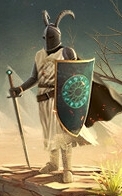
In Zodiac Legion, characters support each other in combat, and a medium-sized shield also protects the characters nearby from ranged attacks. We also decided to replace attacks of opportunity with a more complex check for pinning characters trying to move when engaged in melee combat. This check involves a calculation of relative supports from both sides on the starting and target tiles.
For the same reason, we’re reworking the way weapons and armor interact, because we’d like to make heavy armor very difficult to penetrate if a huge advantage isn’t involved, like when an enemy is lying on the ground.
Certain mechanics from X-COM wouldn’t make much sense, like reaction fire: keeping your bowstring drawn for a prolonged period of time is not really feasible, but we might add something similar once we introduce crossbows.
How will recruitment and death work? How will the loss of a veteran unit impact the gameplay? Can you still finish the game after a total squad wipe, or is it mostly a game over like in the modern Xcom games? I also read something about necromancy, will I be able to bring back my dead as undead warriors/zombies?
The meat grinder aspect of OG X-COM is something we’re strongly attached to, but at the same time, fantasy knights are supposed to have a lower turnover rate than X-COM operatives.
We want the loss of a veteran to be a resounding blow to the player, but not the end of the world. There are several things that we want to add to make sure a single defeat is not the end of the campaign:
The exact mechanics are still subject to change, but a part of a character’s power will be derived from the magic resources spent on strengthening the corresponding Zodiac sign’s “altar” in the player’s fortress. Thus losing your most powerful warrior of the Lion will allow another one to retain most of the shrine’s power and take up the mantle of the new champion of that sign.
Some characters will also typically come already quite skilled in non-magical warfare, as a significant part of them will be trained knights.
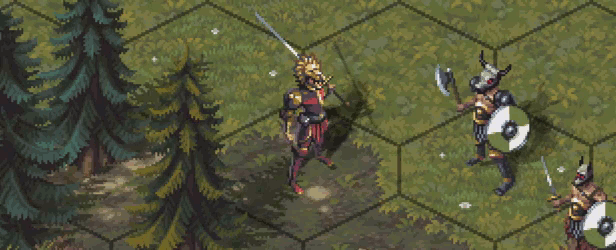
How will loot be acquired, and will it be equipped on an individual basis, or does it work differently?
In a traditional heroic setting, there is a strong connection between a knight and his weapon, so we’d rather have Arthur keep wielding Excalibur instead of swapping it for an extra +3 every 2 levels. In order to do so, we’ll mostly have loot serve as enchantment material, to strengthen the magical power of a character’s weapons and armor. However, on death, it would make sense to transfer the artifacts from one character to another.
What similarities does Zodiac Legion share with X-com, beyond the turn-based combat? Does it have basebuilding, research to be conducted, etc?
The vision for the game had always been to combine the “geoscape” elements of X-COM with traditional dungeon crawling, so the game will definitely have base building and research.
Research plays a major part actually, since the player is tasked with rediscovering arcane knowledge that was lost as a consequence of magic being dormant for centuries.
Unlike OG X-COM, the base building will focus on the Legion’s citadel, while secondary bases will be much less developed.
What do the zodiac signs have to do with the setting at large? It seems intriguing.
The Zodiac signs are the source of the characters’ powers. We went for this theme because Zodiac signs are already something we associate with the supernatural. They also make a good base for character classes, as each corresponds to a different archetype. Aquarius is typically associated with features evocative of a sorcerer, while Cancer would feel closer to a Cleric, and Leo to a Paladin.
Reading a bit on your website, I get the impression that Zodiac Legion will be a bit of a 4X too, am I wrong in this assumption?
That is one of the things we’re trying to balance: we want Zodiac Legion to feel like you’re shaping the strategic situation around you, but through the actions of a few heroes. So we definitely want to give the game 4X vibes, while making most strategic actions resolved through tactical skirmishes.
A clash between two military forces may lead to missions like assassinating the enemy commander, then destroying a bridge to cut the enemy’s supply line and end their chevauchée.
The 4X elements will also let the player resolve some late game situations through the use of brute force (with armies or magic) once the might of his order of arcane knights becomes sufficient, acting like a kind of late game auto-resolve.
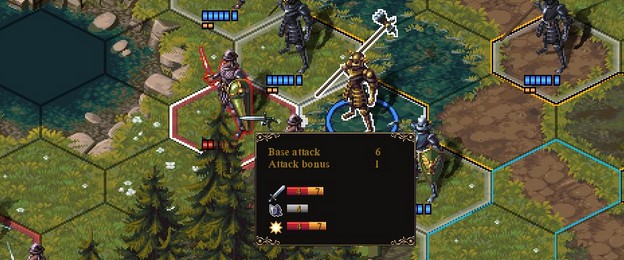
How will the different fighting styles be balanced, and what are the fighting styles? I’m hoping magic won’t be the psionics of Zodiac Legion, dominating the endgame almost purely by itself!
Magic will be pretty important in the end game, but the “warrior” classes will have access to it in their own way, a bit like physical adepts in Shadowrun. So late game warriors will behave more like paladins than purely mundane fighters.
Also, when it comes to the effects of magic, we want it to act as a gradual expansion of the player’s options in combat. The baseline for everything is “medieval dungeon crawling,” and this is never supposed to be displaced by the magic, but rather enhanced by it – by scattering enemy formations with fireballs, breaching dungeon walls with “explosive” skills or freezing water to create an impromptu bridge.
Which style of fighting do you prefer yourself?
In order to get direct experience in melee fighting, I trained with a longsword a bit. I also tried some variations (sword and shield, rapier and dagger), but I had the most fun with group melee combat, as the mix of group and personal decision felt very interesting.
I also tried to make fighter/mage hybrid characters work in a lot of games, but they have underperformed most of the time.
How will you make sure the turn-based combat feels snappy, to not get bogged down in fights that take hours to complete?
That’s one of our major issues actually: long missions can be quite taxing, and that makes it even worse if there’s downtime. That’s also an area where we want to get player feedback, because as developers, our own perception in this context is skewed.
I also added tools to control the “sanity” of the levels generated, to make sure they wouldn’t need too much backtracking.
Do you want to add anything about the game, about yourself, or maybe something else?
I believe these questions were already in-depth enough that there isn’t much else that could be added. Except perhaps for the standard request that is: Remember to wishlist Zodiac Legion on Steam! It’s really a ton of help.
Any tips for other indie developers out there?
After its debut at a festival, the feedback for Zodiac Legion was pretty negative: the UI was confusing, and the game suffered from pacing issues. Seeing players struggle with the controls was rather heartbreaking. We went back to the drawing board, and reworked quite a few mechanics, the maps, and the UI. That took more than a year, but then the stars finally began to align, and we got some press recognition from journalists or youtubers like Splattercat who showed their interest in the game. Then, the first Steam demo was met with a mixed reception, as new issues altogether had crept in.
I think when crossing a valley of despair, it’s critically important to just focus on the task at hand – otherwise things can get quite intimidating.
Just to make sure, it will be out this year, right?
The plan is indeed to release the game in 2024!
I want to thank Galdred for taking the time to answer all these questions – he turned out to be a real sport about it. Good answers too. Now we just have to wait for Zodiac Legion to be released in Early Access later this year. Going by what is said in the interview, Zodiac Legion seems like a genuine passion project – which is usually the titles that stand out and are played for years. If you find this interview interesting, make sure to wishlist Zodiac Legion on Steam!
Thanks for reading.
/Thomas

